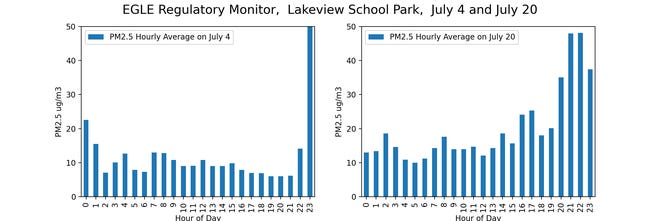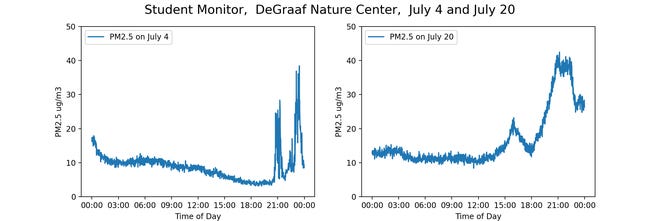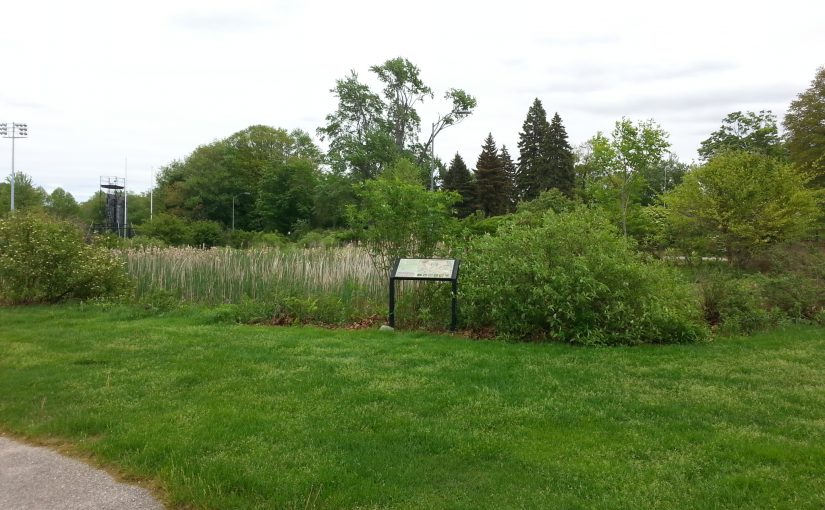A recent report cites 104 fires burning more than 2.4 million acres in 14 U.S. states. Would it surprise you to know that these wildfires impact us here in Holland?
Pictures from National Oceanic and Atmospheric Administration data show wildfire smoke wafting through West Michigan last month. Did you notice these plumes as they drifted through Holland? Hazy skies and fantastic red sunsets for photographers were one indication.
Scientists saw them, too. Scientists use data to “see” things. For example, advanced air quality monitors at the Lakeview School Park on 32nd Street in Holland generate daily air quality data.
These monitors collect data for the Michigan Department of Environment, Great Lakes, and Energy and the U.S Environmental Protection Agency. For example, a chart from July 4 clearly indicates the air quality impact from fireworks at the end of the day. Another chart shows data from July 20, when the smoke plume passed through town.
Students and teachers collect and study Holland air quality data, too, thanks to a local network of student monitors. The project is managed by Hope College’s ExploreHope Academic Outreach office and is funded through the Michigan Space Grant Consortium.
“Our project brings authentic experiences in data collection to middle school and high school classrooms throughout Western Michigan,” said Susan Ipri Brown, the program director and assistant professor of engineering instruction. “Our monitors, though not directly calibrated to the EGLE monitors, let local students and teachers see the same data patterns.”


“The monitors are excellent inquiry-based tools for students using state-of-the-art technology,” science teacher Bob DeBruyn said. “Students use data they collect to answer questions they are curious about. They feel like real scientists.”
Collective Idea, a Holland software company, equips these monitors to report data live and in real time.
“Our team loves working with the community — students, the public and decision makers — to show meaningful data in real-time at a fraction of the cost of government monitors,” CEO Dan Morrison said.
Joe Sikma, sustainability manager at the Outdoor Discovery Center, put a monitor at the DeGraaf Nature Center and another on the roof of Holland City Hall, as part of the effort “to increase air quality awareness and provide real-world educational opportunities for students.”
With these monitors, students see the same data patterns seen from the professional monitors. The graphs from the student monitors clearly indicate the effect of the Fourth of July fireworks, for instance. It’s real data, real events, and real student learning.
Sometimes students ask if the air they are studying is safe. Smoke contains particulate matter smaller than 2.5 millionth of a meter. As we breath, these particles pass through our lungs and into our bloodstreams, reaching vital organs.
Health standards for matter of that size consider 24-hour exposures.
“Short upticks from a night of fireworks are less concerning than long-time exposures,” noted Jeff Pfost, a local air quality consultant.
It’s all connected. From wildfires to air quality, from Space Consortium grants to science classrooms, it’s amazing how the people of Holland work together to help our students learn.
Be your own data scientist:
- Check Holland air quality data on the web, from the official EGLE monitors at deqmiair.org/monitoringdata.cfm?site=1612 or see data from the local student monitors at parts.pm/projects/237/readings
- Students and teachers can join the educational air quality program at hope.edu/explore/airquality.
— Don Triezenberg is a physics and mathematics teacher. In retirement, Don volunteers with the student air quality monitor program at Hope College and advocates for a rigorous Community Energy Plan for Holland.
About this series
Living Sustainably is a collection of community voices sharing updates about local sustainability initiatives.
This Week’s Sustainability Framework Theme:
Community Knowledge: The collective knowledge and energy of the community is an incredible resource that must be channeled to where it is needed.


